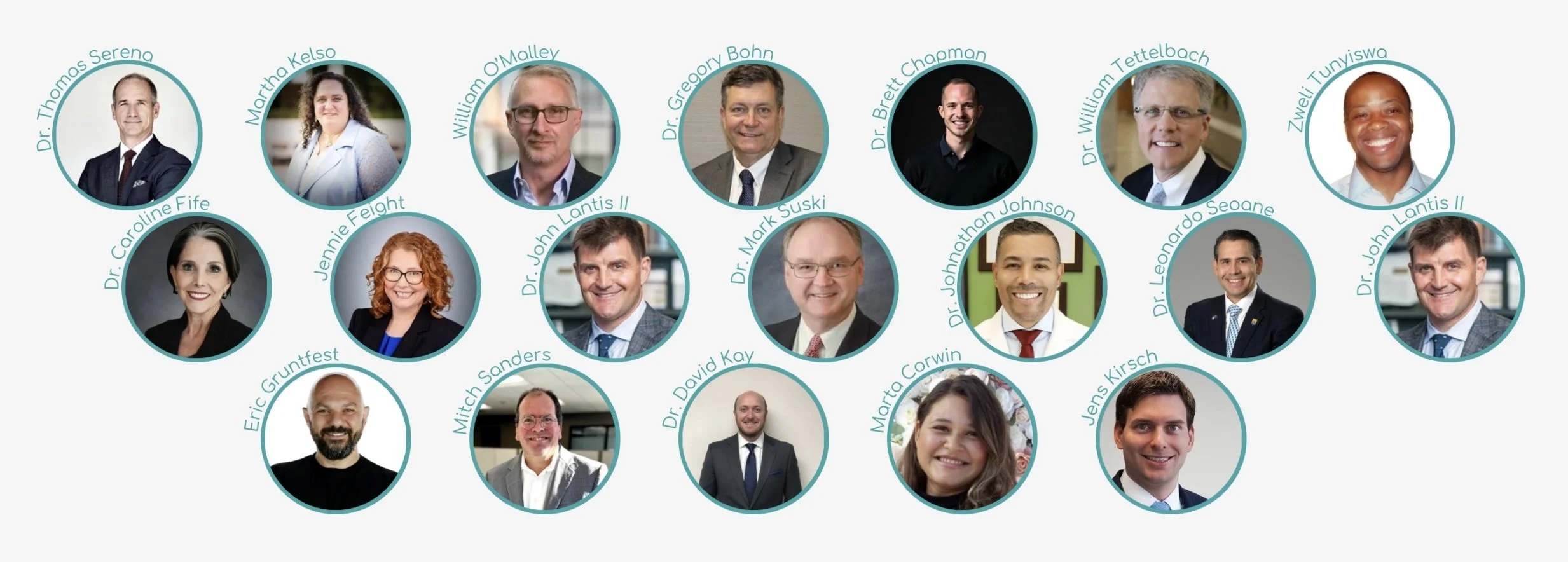DAY ONE November 13th
Track 1
Main Auditorium
-
Clinicians face a plethora of choices in CAMPs. This session will examine the critical factors that guide CAMPs selection in real-world practice. From availability and cost considerations to differences in mode of action, storage requirements, and wound-specific applications, the session will discuss how to navigate the growing array of options
-
The world of CAMPs is evolving at an unprecedented pace, driven by the rise of innovative biomaterials and cutting-edge technologies. This session will explore the latest scientific and clinical developments shaping the field—from the dawn of new synthetics to breakthroughs in collagen engineering and novel applications of amnion.
-
The rapid evolution of imaging technologies has transformed the management of surgical wounds. This session looks at a recent expert consensus that explored how fluorescence imaging has the potential to improve outcomes in surgical patients across the globe.
-
-
This lecture will provide a comprehensive overview of master trial designs, with a focus on their application in CAMP clinical trials. It will explore how these innovative frameworks enable the efficient evaluation of multiple interventions within a single protocol, reducing redundancy, accelerating timelines, and enhancing flexibility in clinical research.
Participants will learn the key features of platform and basket trials, and how adaptive methodologies such as Bayesian response-adaptive randomization, interim analyses, and seamless phase transitions are integrated into CAMP designs. The session introduce the attendees to the revolution in wound care research.
-
Meta-analysis provides quantitative insight to complement GRADE, especially when evidence is fragmented or limited. This session highlights how Bayesian models, risk ratios, and posterior probabilities translate trial data into interpretable measures that meet the evidentiary expectations of multiple decision-making audiences.
-
-
This session will focus on emerging real-world data and clinical insights driving advancements in pressure ulcer prevention and management. Speakers will present findings from recent studies. Attendees will gain practical knowledge on how real-world evidence is shaping best practices, informing policy, and improving quality of care for individuals at risk of or living with pressure ulcers.
-
This session will present a recently published consensus addressing the critical evidence gaps surrounding CAMPs. This work provides a roadmap for generating high-quality data that can inform clinical decision-making and withstand scientific scrutiny. Attendees will gain an in-depth understanding of the consensus process, the key recommendations for advancing CAMP research, and how these guidelines can accelerate the development of robust, clinically relevant evidence to improve patient outcomes.
-
Track 3
IPAWS Track
Track 2
Tissue Repair Evidence Track
-
Image guided debridement targeting pathological wound bacteria has improved wound healing outcomes. This technique identifies wound biofilm bacteria allowing more effective removal. More efficient healing results and can impact integration of CAMPS products. This activity is endorsed by the American Board of Wound Healing meeting Maintenance of Certification criteria.
-
Summary: Mobile wound care is one of the fastest-growing healthcare models—but are you capturing its full financial potential? This session reveals smart strategies to boost revenue, streamline operations, and keep your practice thriving. Attendees will walk away with actionable insights to grow sustainably without compromising patient care.
Objective: Empower providers with practical tools to maximize profitability, efficiency, and long-term success in mobile wound care. -
Shifting from a traditional practice to a mobile service model offers exciting opportunities to expand access, improve patient convenience, and streamline care delivery - but it also requires careful planning and execution. This session provides a step-by-step guide to building a successful mobile practice.
-
Clinicians in post-acute care face unique challenges when selecting CAMPs. Storage constraints, cost pressures, and the need for timely, effective wound healing all play critical roles in determining which products are most viable in practice. This session takes a hands-on approach to CAMPs selection, focusing on products that can be realistically implemented in post-acute environment.
-
Details to Follow.
-
From scheduling headaches to documentation overload, running mobile wound care can feel overwhelming. In this dynamic discussion, Dr. Naz Wahab and Martha Kelso tackle the real-world frustrations—and share solutions to bring balance back to your practice. Together, we’ll explore ways to reduce stress, improve workflows, and elevate both provider and patient experiences.
Objective: Provide strategies to ease common pain points, enhance team efficiency, and support better outcomes in mobile wound care. -
Documenting and navigating the electronic health record can be daunting in the post-acute setting, but this session will help attendees to manage this more smoothly.
-
This lecture explores evolving approaches to wound bed preparation through debridement, focusing on alternatives to traditional sharp, surgical methods. Participants will gain an in-depth understanding of the biological and clinical rationale for removing necrotic tissue, slough, and biofilm, and how newer strategies can improve healing trajectories, reduce complications, and enhance patient comfort.
-
Welcome Symposium Introduction and Headline Feature GArrett Grinsfelder, Dr. Thomas Serena & Anthony Kerr.
-
Cellular, acellular, and matrix-like products (CAMPs) are transforming wound care and regenerative medicine—but their future is under threat. This session examines how evolving Medicare and MAC reimbursement policies, pricing pressures, and coverage limitations are reshaping access and adoption. Attendees will gain insight into the clinical, ethical, and economic implications of these changes and what stakeholders must do to keep CAMPs viable in today’s shifting landscape.
-
Audits can be daunting, but they don’t have to be. This session outlines what auditors look for, common mistakes to avoid, and practical systems to stay compliant year-round. Attendees will leave with a clear roadmap for confidence, compliance, and resilience during audits.
-
Real-World Evaluation of Placental Allografts: Across Diverse Wound Types and Settings. Dr. David Kay, Marta Corwin
-
-
-
Dr Caroline Fife
The discussion centers on developing a clinical-research ecosystem, also referred to as a Learning Healthcare System, which bridges clinical practice and research through integrated digital processes. The goal is to create a continuous feedback loop where patient care directly informs research—and research findings, in turn, optimize care at the point of service.
-
Unlock the complexities of NCDs for CAMPS in this focused session. Learn about recent changes, and what they mean for providers and patients.
-
Describe the biological characteristics and functional mechanisms of fish skin grafts, emphasizing their role in promoting wound healing across a range of clinical applications.
Review of the methodology and findings of the largest RCT on the use of intact fish skin grafts (IFSG) vs. Standard of Care (SOC) in treating University of Texas (UT) Grades 2 and 3 diabetic foot ulcers (DFU's)
Examine the clinical data supporting the use of fish skin grafts with a focus on documented successes and illustrative case reports.
-
Details to follow
-
details to follow
-
Organogenesis Gold Indutry Symposium Dr. Rose Resendez & Antonio Montecalvo
-
This panel will bring together experts in health economics and clinical wound management to explore how expanding access to care and strengthening patient resources can transform outcomes. The discussion will highlight the interplay between wound care costs and comorbidities, examine the systemic barriers patients face in receiving comprehensive treatment, and showcase models of care that have successfully reduced costs through early intervention and improved patient support.
-
Secure Your Spot at IPAWS 2025
Join leading clinicians, researchers, and innovators in wound care for three days of CME-accredited sessions, real-world data, and global networking — all for just $499.
This is your chance to:
Access exclusive insights from world-renowned faculty
Earn CME credits across dedicated tracks
Connect with peers and industry leaders at The Ritz-Carlton, New Orleans




